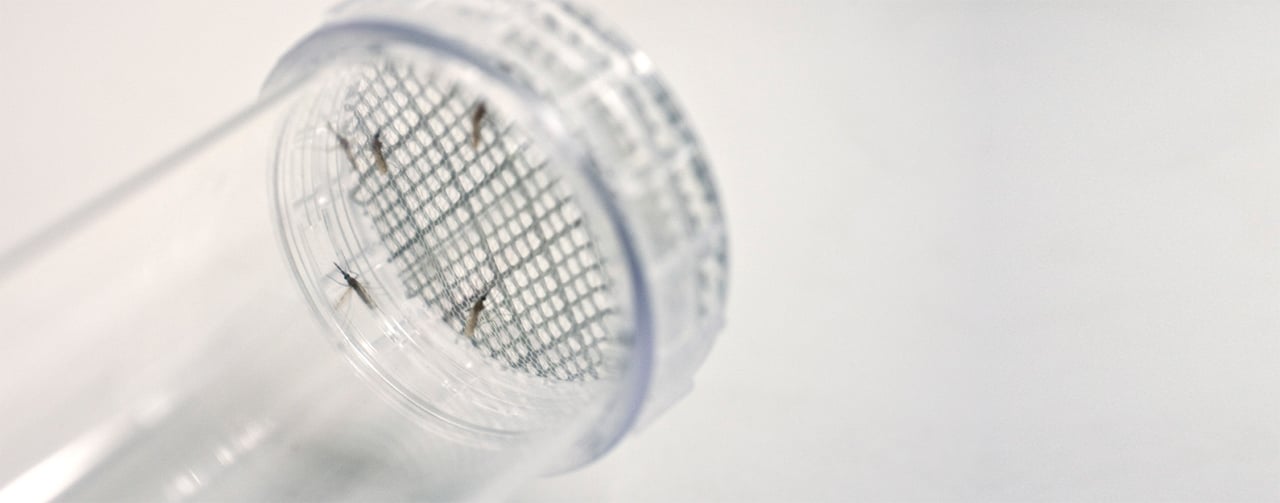
Mosquitoes in WHO tube. Credit: LSHTM
GenoScent
Investigating the genetic basis of human attractiveness to malaria mosquitoes.
Combining genomics, chemical and behavioural ecology, GenoScent is investigating how humans produce natural mosquito attractants and repellents, with the aim of developing new types of protection against bites and malaria.
Recent updates
Events
Newsletter
Contact us
Dr Julien Martinez
Research Fellow
Catherine Oke
Research Assistant
Prof James Logan
Chief Investigator
Background
Some people are bitten more than others by mosquitoes, which is fundamentally important because those who get bitten less often are less likely to die from lethal mosquito-borne diseases like malaria. There is evidence that this differential attractiveness to mosquitoes is largely due to how you smell – previous work has shown that people who are less attractive to mosquitoes produce volatile organic compounds that act as natural mosquito repellents, and differences in attractiveness are partly controlled by a person’s genes. However, we still do not know how the body produces these chemicals or which genes control the process.
GenoScent is an MRC-funded project that aims to investigate the genetic basis of attractiveness to mosquitoes, both in the UK and in a natural host-vector-parasite system in The Gambia. The study will provide insight into the mechanisms that can affect our body odour, and make people more or less attractive to mosquitoes.
By collecting body odour from identical and non-identical twins in the UK and The Gambia, we will test the relative attractiveness of twins to the major vector of malaria, Anopheles mosquitoes, in behavioural experiments as well as investigate their odour profiles. The attractiveness and odour profile will then be used in an association study to correlate these traits with the presence of specific genetic variants in the volunteers’ genome.
Study objectives
Our three study objectives are to:
- Identify human volatiles that attract or repel mosquitoes in people from the UK
-
By recruiting volunteers from the TwinsUK database, we will collect and characterise the body odour profile of 100 pairs of identical and non-identical twins, as well as measure their attractiveness to malaria mosquitoes using established laboratory behavioural studies, volatile collection techniques and analytical chemistry.
- Test the genetic basis of attraction and repellency to mosquitoes using a natural host-vector parasite system
-
People who repel mosquitoes may have a survival advantage against mosquito-borne diseases such as malaria. Therefore, the genes involved in body odour production are likely to be under strong selective pressure in African populations exposed to the parasite. In this phase of the study, we will determine the relative level of attractiveness of 100 pairs of identical and non-identical Gambian twins.
The aim here is to also investigate potential interactions with malaria parasites in our study population, as when people are infected with the parasite, they become more attractive to mosquitoes which is linked to a change in their odour profile.
- Identify genes involved in the production of mosquito repellents
-
In collaboration with the University of Nottingham and St George’s, we will conduct an association analysis between attractiveness, body chemistry and genetic variants using existing genome-wide polymorphism data from the twins.
Implications of this study
This study has the potential to provide new insights into the host-vector-parasite interaction, and could lead to novel ways to control diseases such as malaria.
By understanding how the body creates natural “resistance” to mosquito bites, this could allow us to develop a new treatment which stimulates production of repellent chemicals in susceptible humans, protecting them against mosquito bites and disease. This could revolutionise the way we protect ourselves against mosquito bites and mosquito-borne diseases.
Professor John Armour
University of Nottingham
Professor John Pickett
Cardiff University
Professor Steven Lindsay
Durham University
Dr Rachel Allen
St George’s, University of London
Professor Umberto D’Alessandro
MRC Unit The Gambia at LSHTM
Recent updates
Events
Newsletter
Contact us
Dr Julien Martinez
Research Fellow
Catherine Oke
Research Assistant
Prof James Logan
Chief Investigator
Here’s some of our relevant publications:
Recent updates
Events
Newsletter
Contact us
Dr Julien Martinez
Research Fellow
Catherine Oke
Research Assistant
Prof James Logan
Chief Investigator
